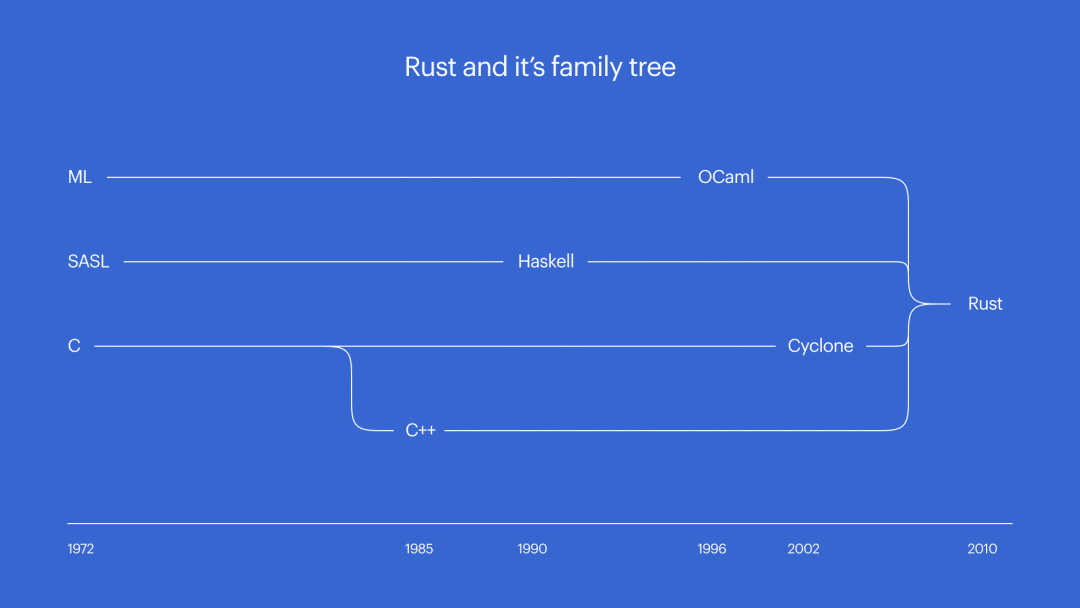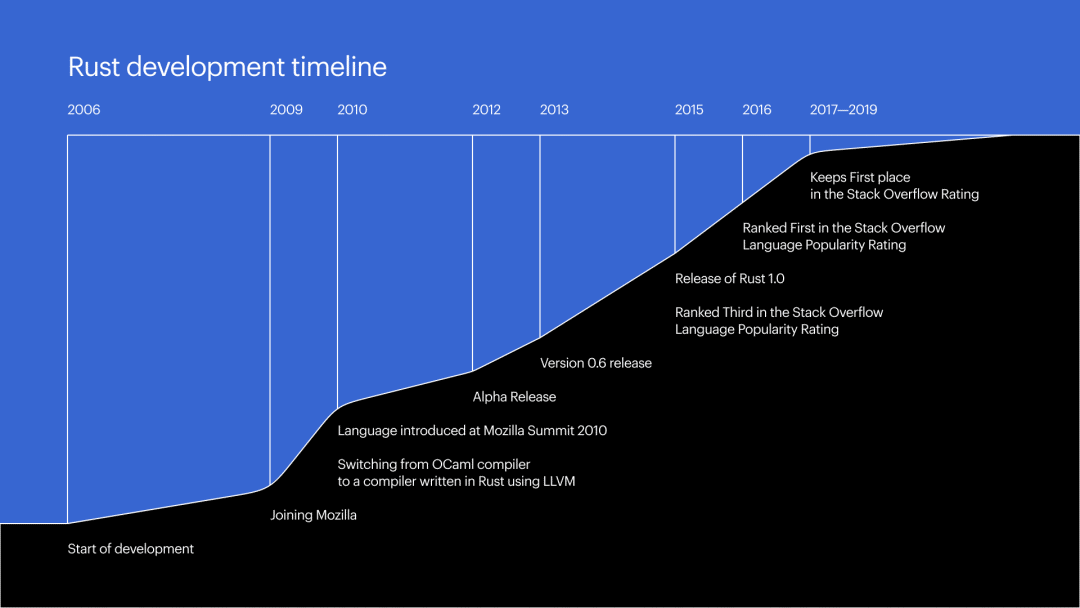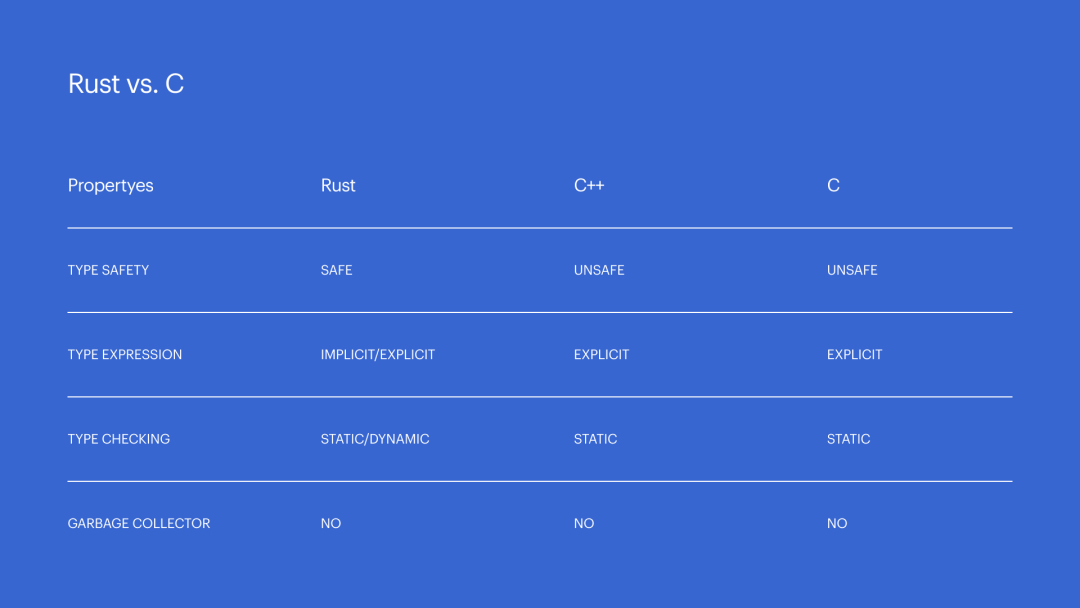
Author | Evrone
Planner | Xiao Zhi
Rust is an ambitious project by the Mozilla Foundation, touted as the successor to C and C++. For a long time, some fundamental issues in C/C++ have remained unresolved, such as segmentation faults, manual memory management, risks of memory leaks, and unpredictable compiler behavior. The birth of Rust aims to address these issues while enhancing safety and performance.
Evrone (a software company) has utilized Rust in many projects, and our engineers have accumulated rich experience in this area. In this article, we will share some of Rust’s main features.
Main Features
-
Strong static typing;
-
No garbage collection and the ability to manually control data storage locations through pointers;
-
A powerful built-in static code analyzer that helps avoid issues related to memory management and multithreading;
-
C language-style syntax with concise keywords.

1 History of Rust
The Rust project was initiated by Graydon Hore in 2008. In 2009, Mozilla expressed interest in the project. A year later, the project was officially made public. The first alpha version of Rust was released in 2012. A year later, developers of the Servo Web engine (based on Rust) announced that they received support from Samsung to port the engine to ARM architecture.
Rust 1.0 was released in May 2015. In the same year, Rust ranked third in the most popular development tools list published by Stack Overflow. Since 2016, Rust has consistently ranked at the top.

2 Why Use Rust Advantages
-
A unified compiler that provides a built-in package builder and manager, testing system, and documentation generator;
-
Safe memory management that helps avoid segmentation faults;
-
Abstraction capabilities that make manual memory management easier;
-
Provides common compilation error fix suggestions;
-
Pointers can only be used in unsafe code—safe code only includes links to objects that definitely exist;
-
Good compatibility with Mac and Unix family systems.
Disadvantages
-
No class and inheritance mechanism, making it difficult to write object-oriented code;
-
The compiler is too strict, sometimes imposing excessive restrictions on memory addresses.

3 Use Cases for Rust
Rust supports major programming paradigms: object-oriented programming, concurrent programming, functional programming, and procedural programming. It provides sufficient memory management capabilities while being safe enough to serve as a development tool for operating systems and critical applications. Its main drawback is the lack of support from hardware vendors, who prefer to use C/C++. Here are some software projects developed using Rust:
-
Redox, a Unix family operating system based on a microkernel, most of the software in this operating system is also developed using Rust;
-
Servo, a multithreaded Web engine;
-
Firecracker, a micro-virtualization system for serverless environments.
4 Blockchain Systems Developed with Rust
Distributed ledger-based systems must be able to process requests quickly with minimal device computational load. C++ is very suitable for this task, and developing blockchain systems with Rust will be even more efficient. Here are some noteworthy cases:
-
Parity.io—a client for Ethereum and Bitcoin;
-
Polkadot.network—a heterogeneous blockchain network;
-
Exonum, a blockchain-based project framework;
-
MaidSafe, a distributed data processing and storage system;
-
Solana, a platform for developing Web blockchain applications.
Rust can be used to develop Web projects: Rust’s SDK can be used for both front-end and back-end development. For example, using Yew (inspired by React and Angular) for client development and Actix-web (a high-performance framework that supports WebSockets, TLS, and HTTP/2.0) for developing Web servers.
Other tools include: rocket, conduit, gotham, pencil.
5 Some Successful Rust Projects
-
Dropbox, a cloud storage service; OpenDNS, a web service for creating public DNS servers;
-
Coursera, an educational portal created by IT professors from Stanford University;
-
Machine learning projects developed using Rust.
Neural networks developed using Rust seem very promising. Due to Rust’s high performance and low-level memory control capabilities, Rust APIs could become very popular development tools in the field of neural networks.
However, currently, using Rust to develop machine learning applications is still in the experimental stage, and the Rust ecosystem lacks libraries for developing neural networks similar to those in Python.
6 The Future of Rust
C++ has dominated the programming language field for nearly 40 years, becoming an industry standard and maintaining that title to this day. Rust is actively evolving, attempting to address the most critical flaws in C++ and other programming languages.
At Evrone, we have developed a large ERP system for a chain restaurant using Rust. The microservices part is developed in Rust, providing users with data from the restaurant closest to them.
Another application of Rust is our continuous integration service, Vexor. In this service, Rust is responsible for task management and scheduling, as well as log management, serving as the foundation for task isolation execution agents.
Further Reading:
https://hackernoon.com/why-rust-is-meant-to-replace-c-xf8l3yei
Click to see fewer bugs👇